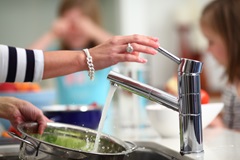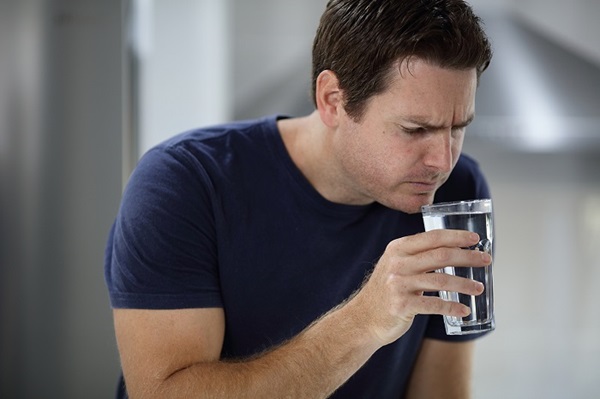.jpg?h=333&w=500&la=en&hash=BD6FB2EBD84AF73CF38CF60867544628)
What to do about your water quality problem
Why does this happen?
A sudden increase in the rate or direction of water flow through pipes can stir up sediment.
This can happen during planned maintenance on the water supply network or during emergency repairs to fix a fault in the network. Our crews flush water mains when works/repairs are completed.
Corrosion of the pipes in the plumbing on your property could also be a cause.
What to do:
- Check the outages map to see if there are any works or emergencies near you.
- Run the outside tap closest to your water meter until the water runs clear (for up to five to ten minutes of flushing).
- Run the outside tap at the back of your property until the water is clear (for up to five to ten minutes of flushing).
- Contact us if the water does not clear after flushing.
- If you have dirty water, avoid using the dishwasher or washing machine until the issue is fixed.
- The water is safe to consume. If there is ever any health risk in the water supply, Unitywater will notify the public immediately.
Why does this happen?
Air trapped inside pressurised water pipes converts to tiny air bubbles.
This gives water a white or milky appearance. This can happen during planned maintenance on the water supply network or during emergency repairs to fix a fault in the network. Our crews flush water mains when works/repairs are completed.
What to do:
- Check the outages map to see if there are any works or emergencies near you.
- Fill a glass, jug or container with water and allow it to sit for 10 minutes. It should be clear after settling, as the bubbles rise to the top and escape.
- Contact us if the water does not clear.
- The water is safe to consume. If there is ever any health risk in the water supply, Unitywater will notify the public immediately.
Some news reports have mentioned a health warning about lead in household pipes. The health warning tells people to flush their taps for 30 seconds in the morning to draw through fresh water.
This warning relates to private household plumbing, not Unitywater’s infrastructure.
Unitywater supplies water that is strictly monitored and rigorously tested.
It meets the requirements set out in the Queensland Public Health Regulation 2005 for drinking water and complies with the Australian Drinking Water Guidelines. The water we supply is completely safe to drink.
Water testing information and reports can be found here.
We can also test household water supplies in our laboratory. More information about these services can be found here.
Will you reimburse me for the 30 seconds of water I’m using every morning? As this warning relates to private household plumbing and not the water Unitywater supplies, we would not provide a reimbursement for this.
Why does this happen?
Chlorine is added to the drinking water supply to maintain disinfection. Sometimes you may be able to taste or smell it.
What to do:
- Fill a jug, glass or container with tap water and let it stand overnight. This should allow any residual chlorine to dissipate.
- Add freshly squeezed lemon juice to the water. Lemon juice contains ascorbic acid which can neutralise chlorine and enhance the taste of the water.
- If the odour is very strong or has appeared suddenly, please contact us to report it.
- The water is safe to consume. If there is ever any health risk in the water supply, Unitywater will notify the public immediately.
Why does this happen?
Sometimes, algae in dams can increase to the point where taste may be affected.
Seqwater closely monitors this and does its best to remove these odours in the treatment process.
Seqwater occasionally alters the direction of flow from the Northern Pipeline Interconnector, drawing water from sources that are different to the ones you’re used to. This can sometimes cause earthy tastes/smells.
Another cause may be if you have above-ground plastic pipes on your property. The plastic may break down over time and biofilm may start growing on the inside of the pipes. Your plumber will be able to inspect your pipes for you. Fill a jug, glass or container with tap water and refrigerate.
What to do:
- Add freshly squeezed lemon juice to the water.
- The water is safe to consume. If there is ever any health risk in the water supply, Unitywater will notify the public immediately.
Why does this happen?
A metallic taste in your tap water usually indicates that iron or copper may be present. This is usually caused by corrosion of household copper plumbing. Copper corrosion can cause blue green staining in basins, sinks, showers and toilet bowls.
It may also occur in new houses with new copper pipes. It will reduce over time.
What to do:
- In the short term, flush the affected tap for two minutes. This clears the water in affected pipes. In the long term, contact a licensed plumber to inspect your pipes for corrosion and replace them if required.
- To treat the staining, use a lemon-based product which contains citric acid.
Why does this happen?
Household plastic pipes laid underground can absorb a petroleum-based hydrocarbon product it has leaked or been sprayed on the ground near the pipes. Have any products such as paints, solvents, petrol or kerosene been used on property lately?
What to do:
- Please ensure chemicals and solvents are used and disposed of properly.
- If these chemicals go into the soil, you will need to dig up and dispose of the affected soil near the pipes.
News reports have mentioned a health warning about lead in household pipes. The health warning tells people to flush their taps for 30 seconds in the morning to draw through fresh water.
This warning relates to private household plumbing products, not Unitywater’s infrastructure.
Unitywater supplies water that is strictly monitored and rigorously tested. It meets the requirements set out in the Queensland Public Health Regulation 2005 for drinking water and complies with the Australian Drinking Water Guidelines. The water we supply is completely safe to drink.
Unitywater's water testing information and reports can be found here.
We can also test household water supplies at our laboratory. More information about these services can be found here.
You might also be interested in
.jpg?as=1&h=160&iar=1&la=en&w=240&hash=0A3E2C92AC0DE391B9DA033D767401BC)
What's in your water
.jpg?as=1&h=156&iar=1&la=en&w=240&hash=E4AD8746FF2923FC74AB80599FDFD04C)
Water quality testing


